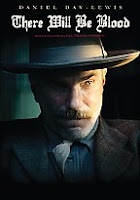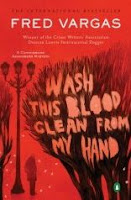There will be second-guessing
 Finally catching up on all the movies I meant to see in 2007, I just finished back-to-back viewings of There Will Be Blood and Into the Wild. One movie is about a completely self-absorbed man whose solipsism and hubris take priority over everything else. The other ... well, ditto.
Finally catching up on all the movies I meant to see in 2007, I just finished back-to-back viewings of There Will Be Blood and Into the Wild. One movie is about a completely self-absorbed man whose solipsism and hubris take priority over everything else. The other ... well, ditto. I suppose Into the Wild was the more entertaining of the two, since the peripheral characters were more artfully drawn and recognizable. It's also beautifully photographed. I do think Sean Penn was easier on Christopher McCandless, the kid who starves to death in the Alaskan wilderness, than John Krakauer was in the book. In the film, McCandless takes on an almost Christ-like aura as he wanders the West, bringing vague epiphanies to all who cross his path. Sort of like "Route 66" without the Vette or Martin Milner. In the book, which I admired, he was a far more complex and troubled figure. Also kind of a petulant one, bent on punishing his parents for the crime causing him certain discomforts as a kid.
Krakauer made the story compelling without romanticizing McCandless, and this is the only complaint I have with the film. Sean Penn clearly sees his protagonist as heroic when there is ample evidence that he was simply breathtakingly foolish, as young men are wont to be. Burning your money in the desert may seem like the ultimate defiance against a soulless society, but it's also telling that we know he burned the money, even though no one was around to see it. This was a grandiose gesture young Chris wanted people to find out about. A bit more dramatic than, say, giving it to a soup kitchen. And a bit less convincing because of the ensuing publicity.
That said, it's a movie I'd see again. I just wish it hadn't left me with the feeling that I was being preached to by a callow kid with stars in his eyes.
There Will Be Blood is a very watchable movie, but it's also a very strange one. Daniel Day-Lewis creates a character not a lot different from Butcher Bill in Gangs of New York -- a greedy, sadistic jerk, but one who speaks with the measured, theatrical cadence of John Huston. You wouldn't call Daniel Plainview a complex character, but his cruelties are defined all the more sharply by the rare little kindnesses he bestows. He's just very interesting to watch. I wasn't surprised to learn that Paul Thomas Anderson wrote the original screenplay with Daniel Day-Lewis in mind. It's hard to imagine anybody else in the role.
I suppose There Will Be Blood owes something to Citizen Kane, with its theme of a man who grasps for the world and reaps only ruin, but there's no Rosebud here. There's nothing to redeem Daniel Plainview, and precious little to explain him. His final line -- "I'm finished" -- has a gamut of meanings, none of which are particularly edifying. I think they love that kind of thing Park City. (And if somebody gets beaten to death with a bowling pin -- well, it's just gravy.)
So many of these critically acclaimed movies send you out of theater (or in this case, my family room) scratching your head and wondering what it all meant. Yes, men and almost-men are occasionally driven by demons or angels, and that alone can be enough for a story. It is with these two films. Both, though, fall short of being the masterpieces they were supposed to be. Dave Bob says check them out anyway.



Comments